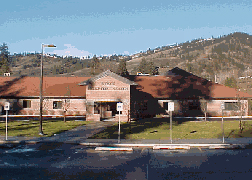

The national news amplifies our awareness of mass murders. Maybe Idahoans feel immune to the tragedy. But my little Idaho town has had two incidents of at least three people murdered in an event since I have lived here. Maybe that meets the criteria.
I can understand why we hear the reflexive reaction to mental health issues. The first perpetrator had demonstrated domestic violence; his wife was his first victim before he shot a cop and a church sexton, wounded a vigilante student before shooting himself.
I knew the second perpetrator from childhood. His behavior had become more unbalanced; his family was deeply concerned and reached out to him. But their concern couldn’t stop him from killing his mother, his landlord and the manager of his favorite fast-food establishment.
I don’t see any clear connection, and I don’t see how such rare, albeit tragic events can give one a sense of direction. I suspect both perpetrators struggled with deep emotional or psychological conflict, even disease.
But few people with mental illness harm others. In fact, in Idaho if you just got shot and killed, it is 13 times more likely you just shot yourself than some else shot you. I’m not sure how a “good guy with a gun” is going to help you there. But maybe access to mental health services might.
Do Idahoans have access to mental health services? Most measurements say we do poorly. A 2019 report from Mental Health America ranked Idaho 50th out of 51 in overall response to mental illness. Mental Illness Policy Org. ranked Idaho 48th in state funding for mental illness.
The Idaho legislature took a bold step 10 years ago and asked for and funded an assessment of how the state was addressing mental health needs. Further, they asked just what should we be doing. The independent evaluation suggested Idaho’s system was fractured and dysfunctional. They made some 35 recommendations.
To the credit of the Department of Health and Welfare, they asked for a follow up evaluation now ten years out. It’s nowhere near as gripping as the Mueller report, but it gives some good direction.
It seems Idaho has made some strong positive steps.
First, we established Regional Behavioral Health Boards. These give regional input to Boise about our varying needs from North to South to East. But they have not gone further to be funded for local or regional contracting of services. Boise can’t let loose of the purse strings.
Second, the DHW established a managed care contract with a state-wide provider (Optum) for behavioral health services to insure quality. It has not been a smooth roll out, but this was a strong step. Of course, making sure the contractor is doing their job will be a job in itself. Remember how contracted prisons went?
Third, Crisis Centers have been established in an attempt to prevent unnecessary incarceration or acute mental health crises. They were to receive full start-up funding from the state for three years, but after they had demonstrated their effectiveness to counties, more funding would come locally. That will be a hard sell.
Finally, through Millennium Fund grants, many local Recovery Centers have been started. They are peer support centers; they aim to help folks in recovery from substance abuse. But Millennium Funding is just year by year and I can see such support fading from the legislature. Many expect those dollars to fund Medicaid expansion.
The bottom line comes down to funding. Do you really mean to help those struggling? Our founders told us to:
Idaho Constitution, Article X Section 1. STATE TO ESTABLISH AND SUPPORT INSTITUTIONS.
Educational, reformatory, and penal institutions, and those for the benefit of the insane, blind, deaf and dumb, and such other institutions as the public good may require, shall be established and supported by the state in such manner as may be prescribed by law.
